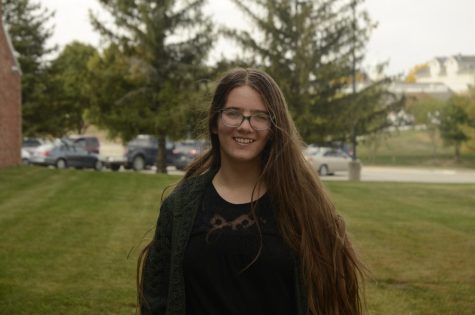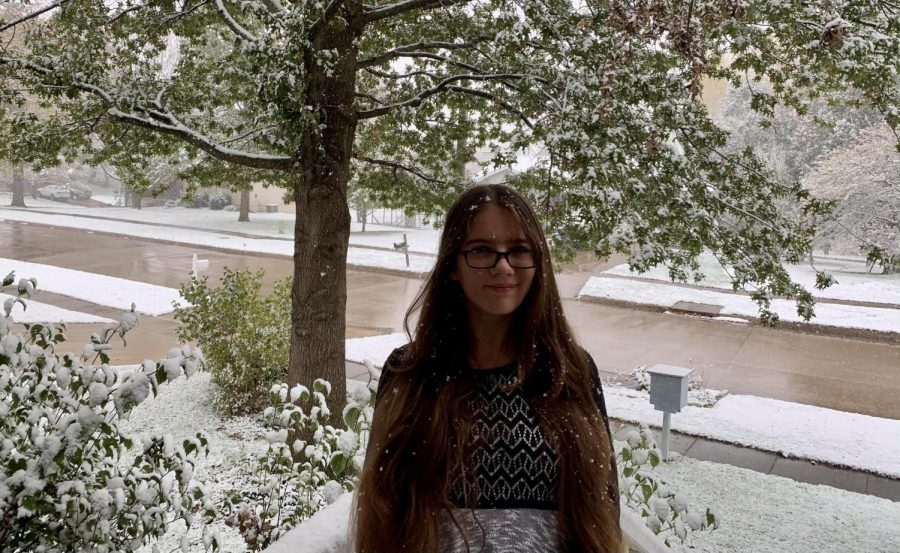Rosemary’s Rambles: watching the climate change
The second installment in a series of columns by WSS reporter Rosemary Timmer Hackert ’23 examines her personal experience with climate change.
Rosemary Timmer-Hackert ’23 stands out in the snow on October 19.
At 16 years old it seems almost impossible for me to have witnessed climate change during my lifetime, but I have. One of the most recent examples I’ve seen was the snowfall on Oct. 19, 2020. My family used to place bets on when we would first see snow. My bet was always around Nov. 25, which is only 11 days off from the real average of Dec. 6. These last two years it has snowed before my family has even had a chance to place our bets. Last year’s snow fell slightly before Halloween and this year’s Oct. 19 snowfall only missed the record for the earliest snowfall in Iowa City by one day.
A larger way that climate change has affected our lives in Iowa semi-recently was the extremely cold temperatures caused by the polar vortex in 2019. Most students in the ICCSD will remember it as that one week it got so cold we only had school on Thursday. While some people use events like these to try to disprove climate change, scientists believe that they may actually become more frequent due to climate change. There is a reason we use the term “climate change” instead of “global warming” now.
While the world overall is getting warmer, in fact, 2020 is on track to be the warmest year on record, it is hard to tell how climate change will have an effect on any individual weather event or place. This makes “climate change” a more apt description, though, in light of 2020, I’m considering calling it “climate chaos.” We’ve had just about everything mother nature can throw at us. The year started out with wildfires in Australia and by September it seemed like every state in the Western US was on fire. We also ran out of letters in the alphabet to name hurricanes with and beat 2005’s record of 28 named hurricanes in a season. And we had a bonus land hurricane just for kicks.
Climate change has been in the back of my mind ever since we first learned about it in elementary school, but it often feels like there is not a lot I can do about it. There’s a long list of things people my age should be doing to address climate change: conserving energy usage, buying organic and local food, cutting down on the amount of meat we eat and trying to walk, bike or use public transportation to get around. But these actions feel insignificant in the face of the overall problem. So we are left with the question: why do them?
I’ve been thinking about this question for a long time, and I think I’ve finally figured out the answer. It is important to make environmentally conscious decisions not because your individual actions really matter, but because they reflect the actions that the larger group will take. In other words, while one person’s actions don’t matter, the actions of the group as a whole do. If you are motivated enough, chances are other people are too, and what’s more is that the more people who do these actions the more other people will feel obligated to do them.
A good way to understand this phenomenon is through K-Pop. In K-Pop it is expected for fans of a certain group to stream their music videos, meaning playing them over and over again. This is why these videos get an insane amount of views. But each individual fan can only add maybe 25 views to a video per day, so from their point of view it barely matters. The reason fans do this is that they trust that the other members of their community will also be doing it. New fans see everyone else doing it and feel obligated to join in. Peer pressure doesn’t always result in negative consequences.
These small actions that people can do to combat climate change are the same way. They don’t do much by themselves, but if it becomes normal in the community for everyone to do them that is when they result in real change. So next time you’re faced with a seemingly inconsequential decision remember this; your actions big or small do matter in the fight against climate change.
Your donation will support the student journalists of West High School. Your contribution will allow us to purchase Scholarship Yearbooks, newsroom equipment and cover our annual website hosting costs.

(she/they) Rosemary is a senior at West High. While this is her third year on staff, it is her first year as the print opinion editor. When she is not...



